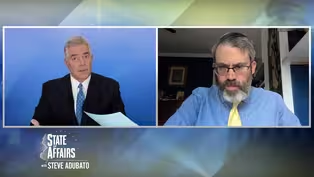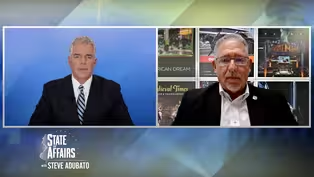State of Affairs with Steve Adubato
New Legislation in NJ Could Curb Nurse Retention Rates
Clip: Season 8 Episode 5 | 9m 28sVideo has Closed Captions
New Legislation in NJ Could Curb Nurse Retention Rates
Steve Adubato is joined by Debbie White, RN, President of Health Professionals and Allied Employees (HPAE), to discuss the alarming rate of nurses leaving the industry and the ways safe staffing legislation in New Jersey can assist in retention.
Problems playing video? | Closed Captioning Feedback
Problems playing video? | Closed Captioning Feedback
State of Affairs with Steve Adubato is a local public television program presented by NJ PBS
State of Affairs with Steve Adubato
New Legislation in NJ Could Curb Nurse Retention Rates
Clip: Season 8 Episode 5 | 9m 28sVideo has Closed Captions
Steve Adubato is joined by Debbie White, RN, President of Health Professionals and Allied Employees (HPAE), to discuss the alarming rate of nurses leaving the industry and the ways safe staffing legislation in New Jersey can assist in retention.
Problems playing video? | Closed Captioning Feedback
How to Watch State of Affairs with Steve Adubato
State of Affairs with Steve Adubato is available to stream on pbs.org and the free PBS App, available on iPhone, Apple TV, Android TV, Android smartphones, Amazon Fire TV, Amazon Fire Tablet, Roku, Samsung Smart TV, and Vizio.
Providing Support for PBS.org
Learn Moreabout PBS online sponsorship[INSPRATIONAL MUSIC STING] - Hi, everyone.
Steve Adubato here.
We kick off the program talking about the nursing situation in the State of New Jersey, the region, and the nation, with Debbie White, President of Health Professionals and Allied Employees healthcare union.
Good to have you with us, Debbie.
- Thank you, Steve.
- Hey Debbie, put into context the role of the union vis-a-vis the nurses in the State of New Jersey.
- Steve, we represent about 14,000 healthcare workers in the State of New Jersey.
During the pandemic, everyone knows how traumatic it was for healthcare workers.
For the next two years, though, we heard stories from members of a mass exodus.
So instead of just hearing these anecdotal stories, we contracted with a research company to do a survey, and the statistics we found were alarming.
30% had left hospitals of the nurses working- - 30% of nurses have left?
Since when?
- Since the pandemic began.
- Go ahead.
More terrible numbers.
Go ahead.
Which are not numbers, they're people.
So go ahead.
- Yeah, they are people.
You're right.
Of those that remain, that 70%, 72%, they were considering leaving, but the most alarming statistic was that 95% of the nurses with zero to five years experience said they were likely to leave their hospital jobs.
Why, you might ask?
- New nurses?
- New nurses.
New nurses.
- Go ahead.
Why?
- Number one reason, unsafe staffing.
Number two reason, stress and burnout due to unsafe staffing.
And I can tell you this, hospitals are struggling to retain the nurses they have, because they will not continue to work in an unsafe staffing situation.
- Let me ask you this, and we'll have a whole range of healthcare professionals, folks who represent hospitals who may have a different point of view than what Debbie's sharing right now.
But at the same time, the ranking member of the state senate when it comes to healthcare issues, Senator Joseph Vitale, who's the Chair of the Senate Health Committee, has a piece of legislation that talks specifically and precisely about nursing, nurse patient ratios.
Debbie, what is the legislation, and what would it do if passed into law to address the issues you're talking about?
- Well, the solution is passing this legislation.
The name of the legislation is the Patient Protection and Safe Staffing Act.
It's what nurses want.
It will increase retention of nurses in our hospital.
When we say safe staffing legislation, we are calling for mandatory nurse-to-patient ratios, meaning we limit the number of patients any nurse or healthcare worker can have at any given time.
Ratios are determined by department.
- So, where is the legislation right now?
Because I know sometimes in the state legislature, bills do not move particularly quickly, and then they also have to be addressed by the front office, the governor's office, Governor Murphy.
Please, where is it now?
- We are gearing up for a hearing in the Senate Health Committee.
We have had a hearing without a vote.
We need to have a vote in the Health Committee, and I believe we have the support there in the Health Committee.
But it is the best way to ensure that a patient receives the best care.
- What would the ratios be?
- It is proven- - Sorry, interrupting Debbie.
What would the ratios be?
- Well, it's different for a department, but I can tell you it's not new.
California legislated staffing ratios 20 years ago.
This has given us plenty of time to do the research.
Nurse workloads are significantly lower in California than here in New Jersey, and you'll find many, many studies, many posted on the NIH, that's a National Institutes of Health website, that show there is greater retention of nurses due to less burnout, less stress, and higher job satisfaction in California.
But not only that, it is the right thing to do for patient.
Research done shows that mandating staffing levels is beneficial to patients, to nurses and hospitals.
- Debbie, is Code Red, this national initiative, dealing with quote-unquote safe staffing levels?
Is that what it is?
- Yes, yes it is.
It's a national campaign to get safe staffing legislation passed across the country.
Oregon passed a law.
Pennsylvania is getting ready to pass it in the second house.
It's already gone through the first house.
Their legislation is actually even better than California's, but California is what has been studied.
And I can tell you the multiple benefits of California ratios, what it's done to healthcare.
- Debbie, talk about the other part of this.
We've had several interviews.
Check our previous interviews out with leaders in the nurse education community.
What I mean by that is universities that train the nurses in the future, of the future.
What does the pipeline look like in terms of nurses or people who are going to nursing school?
In spite of everything you've just said or in light of it, I don't know the reasons why people do these things, but my understanding is that a significant number of people are going into the nursing profession.
How the heck could that be true given the situation you described?
- They are.
They really are going into the profession.
But as soon as we recruit them into our hospitals, they leave just as quickly.
Remember that statistic I pointed back to.
95% of those with zero to five years- - In the first five years?
- experience are leaving.
- They say what?
Say it again.
I interrupted you.
I'm sorry, Debbie.
- 95% of those with zero to five years experience in our hospitals want to leave and are thinking seriously about leaving.
We need to recruit new nurses into hospitals.
Yes, absolutely, but it's not enough, because as fast as new nurses are hired, they leave.
So if we simply address recruitment, it's like, let me give you this analogy.
This is what it's like.
It's like pouring water into a bucket full of holes.
As our hospitals hire new nurses, they leave just as quickly, and until we fix those holes in the bucket, the bucket will never be able to be filled with water.
The holes are what's wrong with our hospitals.
The holes represent the unsafe staffing situation that our nurses are no longer gonna work under.
- Final question.
Pay for nurses part of the equation?
- You know, nurses, pay is, you know, it's always nice to have good wages.
However, that is not the issue.
As you could see by the strike, the Steelworkers strike, that was not the issue.
The issue was staffing.
Staffing was and continues to be the number one issue for nurses across the state.
And let me tell you this, we have five contracts going into bargaining right now.
If we were to pass this legislation, it would take that issue right off the table.
It's what we need in healthcare right now.
- Let me just say this.
We've been working to get Senator Joseph Vitale, the chair of the Senate Health Committee on.
We will have him.
We'll talk about this among, this issue among a whole range of other issues, but this is a huge priority.
Debbie White, I wanna thank you so much for joining us.
We appreciate it.
- Thank you.
- You got it.
Stay with us.
We'll be right back.
- [Narrator] State of Affairs with Steve Adubato is a production of the Caucus Educational Corporation.
Celebrating 30 years in public broadcasting.
Funding has been provided by The Turrell Fund, a foundation serving children.
The Healthcare Foundation of New Jersey.
Horizon Blue Cross Blue Shield of New Jersey.
New Jersey Sharing Network.
Robert Wood Johnson Foundation.
New Jersey’s Clean Energy program.
PSEG Foundation.
The Port Authority of New York and New Jersey.
And by Seton Hall University.
Promotional support provided by NJBIZ.
And by Insider NJ.
- (Inspirational Music) - (Narrator) Great drive fuels the leaders of tomorrow and today.
Great vision paves the way for a brighter future.
Great ambition goes places, moving onward and upward.
Great empathy finds strength in kindness and in each other, working together to create something bigger than they ever imagined.
Great minds can change the world and great minds start at Seton Hall.
The Future of NJ Transit & Incentives For Electric Vehicles
Video has Closed Captions
Clip: S8 Ep5 | 10m 37s | The Future of NJ Transit & Incentives For Electric Vehicles (10m 37s)
The Region's Preparation for the 2026 FIFA World Cup
Video has Closed Captions
Clip: S8 Ep5 | 7m 56s | The Region's Preparation for the 2026 FIFA World Cup (7m 56s)
Providing Support for PBS.org
Learn Moreabout PBS online sponsorship
- News and Public Affairs

Top journalists deliver compelling original analysis of the hour's headlines.

- News and Public Affairs

FRONTLINE is investigative journalism that questions, explains and changes our world.












Support for PBS provided by:
State of Affairs with Steve Adubato is a local public television program presented by NJ PBS

